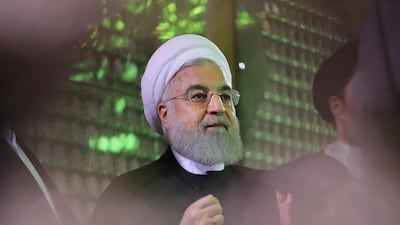Iran's embattled President Hassan Rouhani on Wednesday said the country faced its biggest economic challenge since the Islamic revolution of 1979 and he laid the blame at America's door after the reimposition of sanctions by the Trump administration.
Mr Rouhani's comments follow months of difficulties for his government. The US exit from the 2015 nuclear agreement has disrupted Tehran's plans to develop its economy and ushered in a volatile situation that has seen the rial plummet against the dollar.
A marked deterioration in recent months has seen sporadic protests across Iran, with truck drivers, farmers and merchants voicing their frustration at Mr Rouhani's cabinet, but the president insisted it was the US's decision to unilaterally exit the nuclear deal that had caused financial turbulence.
“Today the country is facing the biggest pressure and economic sanctions in the past 40 years. Today our problems are primarily because of pressure from America and its followers,” Mr Rouhani said, defending his stewardship. “The dutiful government and Islamic system should not be blamed.”
US President Donald Trump has targeted Iran since taking office, exiting the nuclear deal in May last year and subsequently rescinding the sanctions relief that had allowed Tehran to vastly increase foreign currency revenues by expanding its global exports of oil.
The larger effect of ending of the nuclear-related sanctions, however, has been the reduced incentive among European companies to invest in Iran. Mr Trump has threatened to fine any firms that trade with Tehran while seeking access to the US financial system.
Mr Rouhani was first elected in 2013 after promising to re-engage with the international community and gained support at home during the nuclear negotiations after saying a deal would improve the economy. His re-election in 2017 though, on the back of the nuclear agreement, had been preceded by Mr Trump's winning the White House, after a campaign in which he denounced the atomic pact as “the worst deal ever” and denounced Iran's actions in Syria and Iraq as the biggest source of instability in the Middle East.
Beyond the nuclear deal, Iran's ballistic missile tests have become the focus of the Trump administration's ire in recent months, with the US taking the issue to the United Nations.
Unlike the nuclear standoff that led to talks between Iran and the US during the administration of Barack Obama, Mr Trump's stance over the atomic deal has been opposed by the other parties who signed up to the 2015 agreement, causing a diplomatic rift, particularly with the European Union.
International inspectors and the US intelligence community have reported that Iran is continuing to abide by the terms of the nuclear deal. Mr Trump contradicted his own officials on Wednesday, accusing them of underestimating Tehran's activities, a day after a new CIA assessment said North Korea, China and Russia represent the biggest risks to US security interests.
“The intelligence people seem to be extremely passive and naïve when it comes to the dangers of Iran,” the US president responded on Twitter.
“They are wrong! When I became president Iran was making trouble all over the Middle East, and beyond. Since ending the terrible Iran nuclear deal they are MUCH different, but...”
In a second tweet he added: “A source of potential danger and conflict. They are testing rockets (last week) and more, and are coming very close to the edge. Their economy is now crashing, which is the only thing holding them back. Be careful of Iran. Perhaps Intelligence should go back to school!”
US Secretary of State Mike Pompeo told the UN Security Council last month that Iran was blatantly disregarding its obligations to refrain from testing missiles capable of carrying a nuclear weapon. Although Britain, France and Germany agree with the US that action is needed to curb Tehran's missile programme, they stand by the nuclear agreement, saying its primary aim was to control Iran's atomic ambitions, which it has done, according to the International Atomic Energy Authority.
Diplomats are considering other options on how to address Iran's continued testing of missiles but they remain at odds with the US on how to do so, citing Washington's withdrawal from the nuclear agreement as a risk to Europe's own security.

